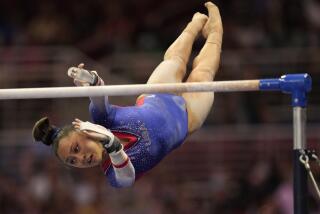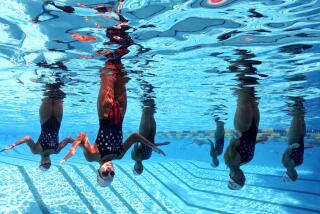Lysacek edges Plushenko for figure-skating gold
He entered in the dark; black costume, slick black hair, deeply tanned face, second place.
He finished in the light, those spangled arms pumping in joy, that hair coming unglued during his spins, the switch flipped from gloom to gold.
Finally, an American male figure skater took the Olympic ice with the guts and skill of, well, an American woman.
Finally, one of our dudes ruffled more than his shirt.
In nine of the most stirringly unexpected minutes of these Olympics, Evan Lysacek torched, Russian rival Evgeni Plushenko trembled, mastery beat might, precision beat power, and the top of a podium was stolen.
For the first time in 22 years, an American male was standing alone there after an Olympic figure-skating competition Thursday at the Pacific Coliseum, Lysacek mounting a memorable comeback to beat defending champion Plushenko by a skate blade.
“I will remember this night forever,” said Lysacek, 24, raised in Chicago and trained in Los Angeles and now officially residing in a dream.
The 6-foot-2 guy with the thin frame and deep stare entered Thursday’s free skate in second place and, in some corners, as a second thought.
Plushenko held a narrow lead, but Plushenko was going to do a four-revolution quad jump while Lysacek, still struggling with the effects of a stress fracture in his left foot, could not.
Plushenko had the flowing blond hair and the swagger; Lysacek did not. Plushenko had the gold-medal resume; Lysacek did not. To have any chance at the gold medal, Lysacek’s detail-oriented routine had to be nearly perfect.
But it was. And Plushenko’s was not.
Lysacek landed his jumps with willful force; Plushenko landed his quad, and others, with a wobble. Lysacek danced across the ice as if he were in a backyard pond; Plushenko tread uncomfortably as if that ice was melting.
Plushenko didn’t fall. He didn’t give it away. Lysacek mugged him for it.
Lysacek skated first in the final group, nailed the routine for a 167.37 score, the crowd roaring, Plushenko surely hearing. Five skaters later, the Russian took the ice wearing a look that few had ever seen on him before.
From the moment he nearly skated into a flower girl, it was clear the cocky legend had been intimidated, and he skated like it, nearly falling several times, and even his program-ending blown kiss to the crowd couldn’t make it nice.
When Plushenko’s scores were announced and it became apparent that Lysacek had won by 1.31 points, the crowd roared again, Plushenko shrugged, and under the stands, Lysacek mimicked skating fans in living rooms all over America.
His jaw dropped in amazement.
He then began hopping up and down and into the arms of his 71-year-old coach, the venerable Frank Carroll, who finally has a piece of gold after coaching three Olympic women medalists who fell short.
“This was what I dreamed about, this is what I worked for,” Lysacek said.
This is also what American skating has dreamed about, a male skater with enough gumption to stand up to the world.
With few believing he could actually survive the week, he recorded his personal best scores in both the short program and the free skate, crying after one and shouting in amazement after the other one.
“I couldn’t have asked for much more than that, to get a personal best in the most important moment of my life,” he said.
So Lysacek didn’t do the quad? So what?
“If it was a jumping contest, they could give us each 10 seconds to go out and do our best,” he said.
So Plushenko was the defending champ? Big deal. While he had basically retired after the Turin Games of 2006, returning only for this Olympic season, Lysacek had spent the last four years in constant work.
“The most important thing about figure skating is the daily training that goes on at home,” he said. “This year I’ve worked harder than I ever have to prepare for this competition.”
As expected, Plushenko immediately started whining, saying that he felt he did a gold-medal performance, questioning judges who didn’t appreciate his jumps.
“Now it’s not men’s figure skating, now it’s dancing,” he said.
He was joined in his disgust by his manager, Ari Zakarian, who said sarcastically, “If he did just one double jump, he would have won.”
They don’t get it, do they? This night was not simply about strength, it was about skill. It was not simply about showing up, it was about following through.
Even in the Olympics, especially in the Olympics, there are lots of ways to get to faster, higher and stronger.
Evan Lysacek showed the world one of those ways Thursday night, burning the gold, bringing the light.
twitter.com/billplaschke
Figure skating :: Men’s free skate
More to Read
Go beyond the scoreboard
Get the latest on L.A.'s teams in the daily Sports Report newsletter.
You may occasionally receive promotional content from the Los Angeles Times.






